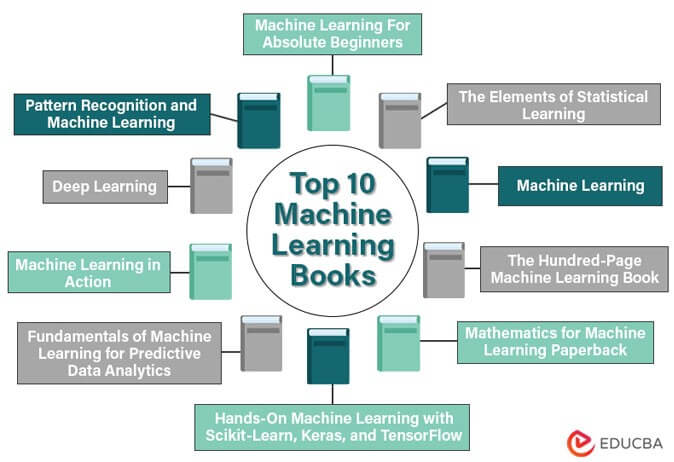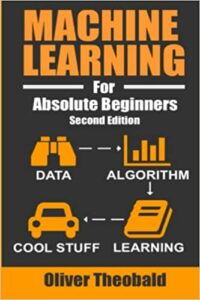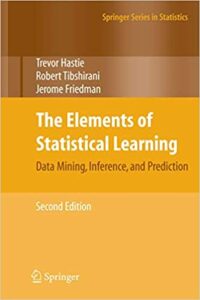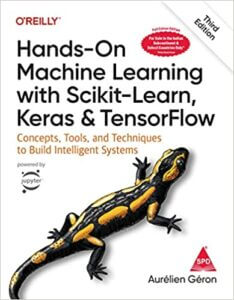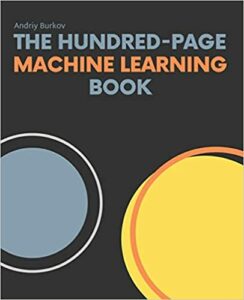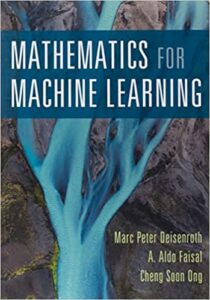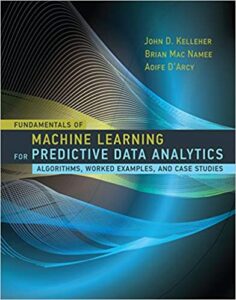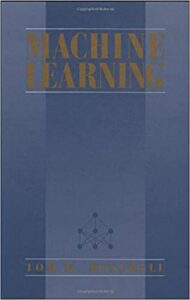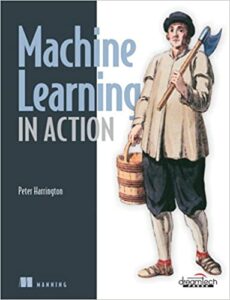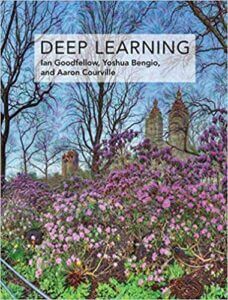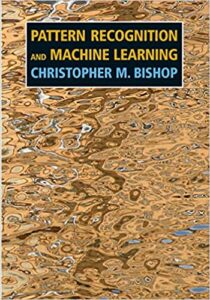Updated September 6, 2023
Best Machine Learning Books [2023]
Machine learning books show how machine learning uses data and algorithms to emulate human understanding. Machine learning, a part of Artificial Intelligence, improves and becomes more and more accurate over time. Technology has progressed in storing and processing power, and machine learning has produced self-driving cars. ML online has also enabled Netflix to apply a recommendation engine for better customer service and business growth. The list Machine Learning Books provides a thorough understanding of machine learning. The selections enable the user to increase their knowledge and make career strides.
The readers will find the list below helpful, whether they are professionals, amateurs, or beginners.
|
# |
Book | Author | Publishing Date |
Ratings |
| 1. | Machine Learning For Absolute Beginners | Oliver Theobald | 2018 | Amazon: 4.4
Goodreads: 3.92 |
| 2. | The Elements of Statistical Learning: Data Mining, Inference, and Prediction | Trevor Hastie, Robert Tibshirani, and Jerome Friedman | 2016 | Amazon: 4.6
Goodreads: 4.42 |
| 3. | Hands-On Machine Learning with Scikit-Learn, Keras, and TensorFlow | Aurélien Géron | 2019 | Amazon: 4.8
Goodreads: 4.56 |
| 4. | The Hundred-Page Machine Learning Book | Andriy Burkov | 2019 | Amazon: 4.6
Goodreads: 4.28 |
| 5. | Mathematics for Machine Learning Paperback | Marc Peter Deisenroth, A. Aldo Faisal, Cheng Soon Ong | 2020 | Amazon: 4.5
Goodreads: 4.37 |
| 6. | Fundamentals of Machine Learning for Predictive Data Analytics: Algorithms, Worked Examples, and Case Studies | John D. Kelleher, Brian Mac Namee, Aoife D’Arcy | 2015 | Amazon: 4.7
Goodreads: 4.42 |
| 7. | Machine Learning | Tom M Mitchell | 1997 | Amazon: 4.3
Goodreads: 4.06 |
| 8 | Machine Learning in Action | Peters Harrington | 2012 | Amazon: 4.1
Goodreads: 3.76 |
| 9. | Deep Learning | Yoshua Bengio, Ian Goodfellow, Aaron Courville | 2016 | Amazon: 4.6
Goodreads: 4.43 |
| 10. | Pattern Recognition and Machine Learning | Christopher M. Bishop | 2016 | Amazon: 4.2
Goodreads: 4.31 |
Let us analyze Machine Learning Books review to help you with the proper selection.
Book #1 Machine Learning For Absolute Beginners
Author: Oliver Theobald
Get this book here
Review:
Machine learning For Absolute Beginners introduces the basics of supervised, unsupervised, and reinforcement learning. It spans other topics like the importance of feature engineering, bias and variance, overfitting and underfitting, and evaluation metrics. In Machine Learning Books this book is best for beginners who wants to start machine learning. Overall, it is a helpful book as a starting point for machine learning and an intro to key concepts and terminology. However, machine learning is a complex field requiring a lot of practice and experimentation.
Key points:
- The user gets hands-on experience with supervised learning and describes how machines train on a labeled dataset and how it minimizes the error between predicted and actual outputs.
- The learner understands unsupervised learning concepts on how to train a machine on an unlabeled dataset.
- The reader understands Bias and Variance errors due to incorrect assumptions in the model or the model’s sensitivity to small fluctuations in the training data.
Book #2 The Elements of Statistical Learning: Data Mining, Inference, and Prediction
Authors: Trevor Hastie, Robert Tibshirani, and Jerome Friedman
Get this book here
Review:
The first part covers bias-variance tradeoffs, model selection, and regularization. Then the author discusses the most popular and widely used methods in Statistical Learning, including linear regression, classification, and tree-based methods. The third section delves into more advanced topics- clustering, dimensionality reduction, and support vector machines. The fourth and final section concludes the book with a discussion of unsupervised learning and some practical considerations for implementing machine learning algorithms.
Key Points:
- The author dives into the various aspects of Supervised Learning methods, including linear regression, logistic regression, decision trees, and support vector machines.
- The book explains unsupervised learning methods such as principal component analysis, clustering, and mixture models.
- The reader grasps Model Selection and Regularization, Neural Networks, Ensemble Methods, and High-Dimensional-Data.
Book #3 Hands-On ML with Scikit-Learn, Keras & TensorFlow
Author: Aurélien Géron
Get this book here
Review:
The book provides a comprehensive and practical guide to building and training machine learning models, covering topics from basic linear regression to advanced deep learning techniques. The author uses an applicative approach, providing real-world examples and code snippets. The code examples are available on GitHub, making it easy for readers to follow along and practice. The book is well-organized and includes data preprocessing, feature engineering, model selection, hyperparameter tuning, and deployment.
Key Points:
- The book covers the end-to-end machine learning workflow, including data preparation, feature engineering, model selection, hyperparameter tuning, and deployment.
- Readers find the examples of Scikit-Learn, Keras, and TensorFlow libraries to build and train machine-learning models highly valuable.
- It covers advanced topics such as convolutional neural networks (CNNs), recurrent neural networks (RNNs), generative adversarial networks (GANs), and reinforcement learning.
- The book provides practical tips for real-world datasets, such as handling missing data, dealing with categorical variables, and scaling features.
Book #4 The Hundred-Page Machine Learning Book
Author: Andriy Burkov
Get this book here
Review:
The Hundred-Page Machine Learning Book introduces machine learning and is written simplistically with practical examples and code snippets that make it easy to follow. Teachers like Sebastian Raschka, an author of “Python Machine Learning,” find the content informative and engaging for the students. The author explains the difference between regression and classification and covers popular algorithms such as linear regression, logistic regression, k-nearest neighbors, decision trees, and support vector machines.
Key Points:
- The book covers the basics of machine learning, including supervised and unsupervised, as well as reinforcement learning.
- It explains how neural networks play a role in image recognition and natural language processing.
- It contains clear explanations and code examples that help readers understand the concepts.
Book #5 Mathematics for Machine Learning
Authors: Marc Peter Deisenroth, A. Aldo Faisal, and Cheng Soon Ong
Get this book here
Review:
Mathematics for machine learning is an excellent resource for anyone looking to learn the mathematical foundations of machine learning. The author explains the mathematical foundations of machine learning and guides how to interpret and analyze the results of machine learning models. The book offers supporting practical examples and exercises aiding readers to apply what they’ve learned.
Key Points:
- The book covers the essential mathematical concepts for understanding machine learning, including linear algebra, calculus, probability theory, and optimization.
- It explains how these mathematical concepts play a role in machine learning with examples.
- The book covers a range of machine learning algorithms, including linear regression, logistic regression, decision trees, support vector machines, and neural networks.
Book #6 Fundamentals of Machine Learning for Predictive Data Analytics
Authors: John D. Kelleher, Brian Mac Namee, and Aoife D’Arcy
Get this book here
Review:
The book offers machine learning for predictive data analytics. The author explains the types of data applicable to machine learning. He elaborates on numerical, categorical, and textual data. The book provides practical examples of machine learning algorithms and techniques, including decision trees, k-nearest neighbors, etc. The book addresses important issues like ethical and social considerations of machine learning and guides how to approach these issues.
Key Points:
- The book provides an overview of machine learning concepts and techniques.
- Being a project-based machine learning, the user understands essential steps, including data preprocessing, feature engineering, model selection, and evaluation.
- It’s a hands-on confidence-building effort packed with programming assignments and exercises that allow readers to practice and apply the concepts learned.
Book #7 Machine Learning
Author: Tom M Mitchell
Get this book here
Review:
This book provides a thorough and well-structured introduction to machine learning. It enables the user to evaluate and interpret the results of machine learning models, including techniques for measuring accuracy and generalization.
Key Points:
- The book defines machine learning as a field and developing algorithms capable of learning from data.
- It enables the reader on the subject matter with practical examples of machine learning algorithms and techniques.
- It explores and illustrates decision trees, artificial neural networks, support vector machines, and more.
Book #8 Machine Learning in Action
Author: Peters Harrington
Buy this book here
Review:
Machine learning in Action binds the fundamental theories with building tools for real-life scenario data analysis. The data analyses come into play with Python-built programs that monitor activities for future development. The reader understands the complicated topics through examples making the learning process more realistic and effortless.
Key Points:
- The reader gets to build programs using Python that help to execute algorithms for data analysis.
- The author demonstrates how to use algorithms to classify data, forecast, and make recommendations with examples.
- The reader explores more complicated features like summarization and simplification.
- The content includes numeric predictions, clustering, and Apriori to recognize association patterns.
Book #9 Deep Learning
Authors: Yoshua Bengio, Ian Goodfellow, and Aaron Courville
Buy this book here
Review:
The authors provide step-by-step guidance for deep neural networks. The supporting examples and code simplify the learning process for beginners. It provides a detailed treatment of convolutional neural networks, recurrent neural networks, and unsupervised learning. The book includes practical examples and code for building and training deep neural networks using popular frameworks such as TensorFlow and PyTorch. It discusses ethical and societal issues related to deep learning, such as privacy, bias, and interpretability. The book is for a deep-learning enthusiast.
Key Points:
- The authors cover the fundamentals of Deep Learning, including neural networks, optimization, regularization, and generative models.
- The book emphasizes the importance of feature learning and Representation Learning in Deep Learning.
- It covers practical techniques for training deep neural networks, including stochastic gradient descent, batch normalization, and drop out.
- It provides detailed coverage of deep reinforcement learning, including Q-learning, policy gradients, and actor-critic methods.
Book #10 Pattern Recognition and Machine Learning
Author: Christopher M. Bishop
Buy this book here
Review:
Code and practical examples in the book simplify learning to build and train machine learning models using MATLAB and Python. Bishop emphasizes the importance of model selection and model evaluation in machine learning. The book explores applicable techniques used in feature selection and extraction in machine learning and dimensionality reduction. The reader understands the role of machine learning in computer vision, natural language processing, and speech recognition.
Key Points:
- The book covers fundamental pattern recognition and machine learning, including probabilistic models, Bayesian methods, and decision theory.
- It provides a detailed treatment of Supervised, Unsupervised, and Semi-supervised Learning.
- The book includes practical examples and code for building and training machine learning models using popular frameworks such as MATLAB and Python.
- It provides detailed coverage of Gaussian processes, kernel methods, and graphical models in machine learning.
Recommended Books
We have compiled a list of the Top 10 Machine Learning Books in the above writeup to assist you in picking up the right one for your needs. To get a more extensive book list in this category, EDUCBA recommends the following:

